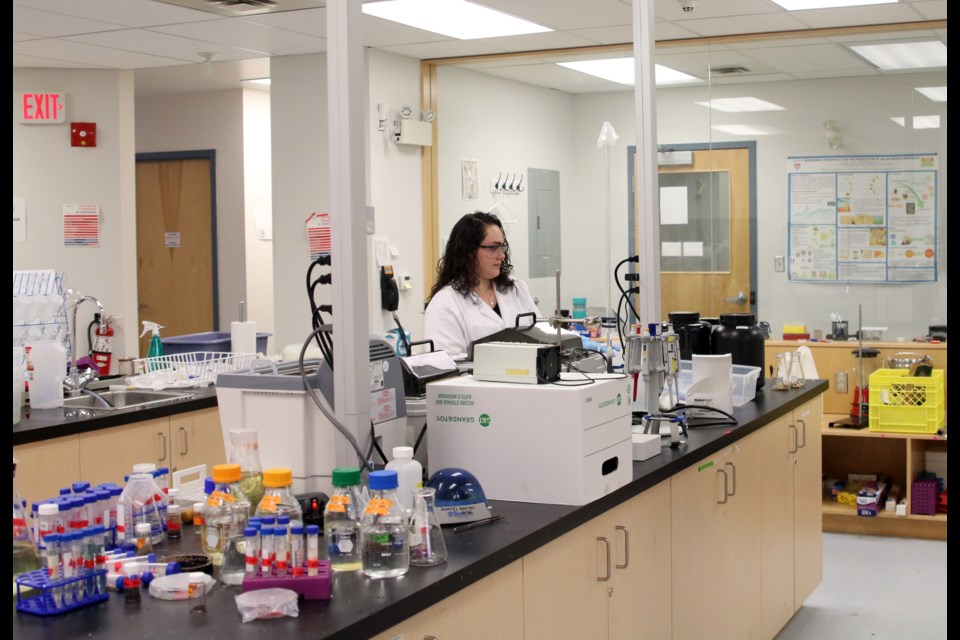THUNDER BAY - From developing alternatives to petroleum products using wood fiber to finding safer ways to detect early signs of cancer, new and returning Canada Research Chairs at Lakehead University continue to make significant strides in innovative research.
Three LU professors have been named in this year’s Canada Research Chairs Program. Sudip Kumar Rakshit, who was renewed as Canada Research Chair in bioenergy and bio-refining processes for a second seven-year term, is looking at ways to produce cleaner energy and chemicals, such as those to make plastics, using resources such as wood fiber.
“We are trying to produce plastics that are biodegradable,” he said. “The word we use is completing the circle. You start from wood, you do some processing, you make plastic, then throw it away. You should complete the circle. You break it down to the starting material you have.”
Rakshit said it has already been well established that agricultural residues can be converted into alcohol, but this places a strain on food supplies. It was also found that making alcohol from starches or agricultural residue was more costly than making alcohol itself.
“We decided instead of making only alcohol from these types of material, can we make other chemicals that are also sourced from petroleum products,” he said. “Most of us don’t realize that all the plastics, resins, and chemicals come from the same petroleum sources.”
According to Rakshit, petroleum producers make more than 60 per cent of profits from products other than petrol. And while he began his academic career with the realization that the cost of petroleum can be very volatile and influenced by a variety of forces, there are even more important reasons for pursuing this kind of research.
“Now the impetus for the work is climate change,” he said. “Some people talk about climate change because of the petrol issue. Climate change is a reality.”
“Now you have a case where you say it is a little bit costlier, but it is made from a woody material, you are not using petroleum, you are not producing carbon dioxide, so you have a case for a little higher price as well. That is where we are today. Make chemicals that are environmentally friendly, are cheaper, and doesn’t affect food security.”
Alla Reznik, who has been awarded a tier 1 Canada Research Chair in physics of radiation medical imaging for seven years, is looking at ways to make cancer screening and cardiovascular procedures safer for patients.
Reznik and her team are developing and testing mobile detectors for advance diagnosis of different diseases, with a major focus on breast cancer diagnosis and cardiovascular procedures.
“Today, cardiac surgery is done whenever possible under image guidance,” she said. “For this we need very sensitive photo radiation medical imaging detectors. So the idea is to make the detectors to detect very small objects while reducing the radiation dose that is normally administered to the patient.”
Exposure to radiation for cancer screening can also be dangerous and Reznik said it is important to find ways to reduce the amount of radiation patients are exposed to as much as possible.
“The less dose we are using for treatment or diagnosis, the safer is the procedure,” she said. “We need constant improvement in detector technology. This is exactly what we are doing here. We are developing new generation of photo radiation imaging detectors for several clinical applications.”
Reznik used the example of breast cancer screening, where a specific cohort of women undergo more frequent screening as the risk of developing breast cancer increases.
Through advancements in molecular imaging, which is normally used for patients already diagnosed with cancer, more patients can be safely screened and exposed to less radiation.
“Molecular imaging traditionally uses very large radiation dose,” Reznik said. “Those doses are okay if patients are unfortunately diagnosed with cancer. But for screening, a test for a certain cohort of patients that are undiagnosed, radiation dose has to be limited because those patients are healthy.”
“We are making detectors which will allow us to reduce the dose so a large cohort of patients will benefit from early breast cancer detection with molecular breast imaging.”
Maryam Ebrahimi was also awarded a tier 2 Canada Research Chair in low-dimensional nanomaterials for five years.
“The areas of research that are being investigated by these faculty members are essential to furthering the research priorities for the university,” said Andrew Dean, vice president of research and innovation at Lakehead. “We thank the Canada Research Program for their continued support to Lakehead University.”
